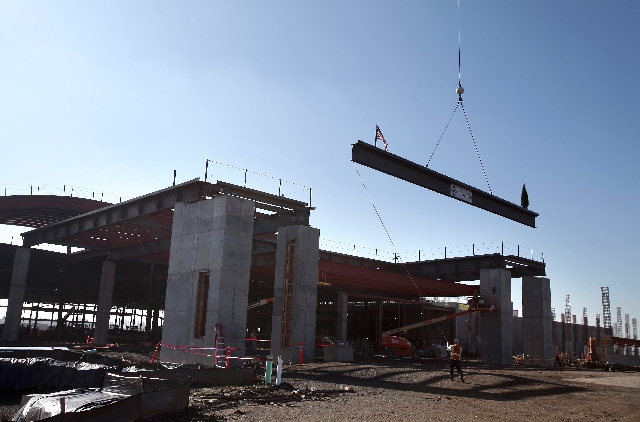Penn National joining party in Indian gaming market

Penn National is not the first commercial casino company to jump into the Indian gaming market.
It probably won’t be the last.
Tribal gaming operations and Nevada casino operators are finding coexistence.
On April 5, Penn National said it would partner with the Jamul Indian Village of San Diego to build a
$360 million hotel-casino on tribal land roughly 20 miles east of downtown San Diego. The Wyomissing, Pa.-based company, which owns M Resort, operates 29 casinos and racetrack casinos in 19 states and provinces.
Penn National’s move was not unusual.
Station Casinos has been in partnership with Indian tribes for more than a decade. The locals gaming giant operates the Gun Lake casino in Western Michigan, is opening the
$850 million Graton Resort & Casino north of San Francisco this fall, and is working with a Fresno-area tribe on developing a central California casino.
Caesars Entertainment Corp. operates Harrah’s Cherokee in North Carolina, Harrah’s Ak Chin near Phoenix and Harrah’s Rincon in northern San Diego County.
“Nevada companies are finding that with Indian casinos, there is a competitive advantage to entering that market,” said Las Vegas gaming attorney Jennifer Carleton. “The tribes are seeing the advantage of joining with a nationally known brand.”
Carleton, a shareholder in Brownstein Hyatt Farber Schreck, spent much of her career practicing Indian gaming law. She was also in-house counsel for a tribal casino in Wisconsin.
Commercial casino companies, such as Penn, Station and Caesars, come to the table with large customer databases, including patrons who reside in nearby communities.
Also, the commercial casino companies have access to financing resources.
Penn National agreed to provide financing to the Jamul Tribe to help complete the project. Once opened, the Hollywood-branded casino will be managed by Penn, which will receive a management fee.
“In a competitive environment, Indian casinos have to differentiate themselves,” Carleton said.
Brownstein Hyatt Farber Schreck assisted Penn National in negotiating the agreement with the Jamul Tribe. Unlike commercial casino deals, there are certain gaming license requirements and governmental approvals required under tribal laws. The project documents were submitted to the National Indian Gaming Commission for approval.
In the past, commercial casinos and Indian gaming steered clear of each other.
Much changed in 2003 when Station Casinos opened Thunder Valley for the United Auburn Tribe near Sacramento, Calif.
The management agreement was secured in the mid-1990s and Station Casinos helped the tribe gain financing for the development. Station Casino’s seven-year management contract expired in 2010 just as the tribe completed construction of a casino expansion and hotel tower.
Station Casinos has found that tribal casino projects can take time for various federal, state and local government approvals, including environmental studies and local impact issues.
The company’s management contracts with the North Fork Mono Rancheria in Madera County, Calif.; the Federated Indians of Graton Rancheria in Sonoma County, Calif.; and the Match-e-be-nash-she-wish Band of Pottawatomi (or Gun Lake Tribe) in Michigan were secured in late 2003 and early 2004.
Gun Lake opened in February 2011 and Graton opens this year. The North Fork Tribe’s land was placed in trust in November. Construction may begin in 2014.
The Jamul Tribe signed a casino compact with California in 1999, but the development stalled on several fronts. An agreement with casino operator Lakes Entertainment fell apart last year.
Meanwhile, San Diego grew into one of the nation’s most competitive Indian gaming markets with nearly a dozen large and small casinos. California has 66 Indian casinos and is the largest tribal gaming market in the U.S.
According to Casino City’s Indian Gaming Industry Report, tribal casinos produced $26.73 billion in gaming revenues in 2010, the highest single-year figure ever produced. California, with $6.78 billion, produced 25 percent of the nation’s total.
Penn National said it hopes to begin construction later this year on the San Diego development, which will have a 200,000-square-foot casino with 1,700 slot machines and 50 table games, along with restaurants, entertainment amenities and a parking garage. The project is expected to take 24 months to complete.












